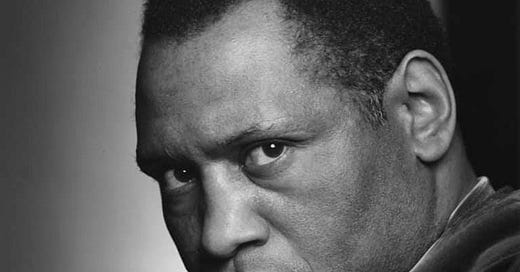The great Paul Robeson was a legendary scholar, athlete, attorney, actor, and vocal performer whose remarkable career was cut short due to his outspoken political views regarding Black political and civil rights in America.
Paul Robeson
Born on April 9, 1898 in Princeton, New Jersey, Robeson was a prodigiously gifted student-athlete who won an academic scholarship to Rutgers College in 1915. A two-time consensus All-American in football, after graduating as class valedictorian, Robeson entered law school at Columbia University where he would earn an LL.B while playing professionally in the National Football League. During his school days, Robeson was an initiate of the Nu Chapter of Alpha Phi Alpha Fraternity.
A gifted singer and actor, Robeson became one of the brightest lights of the Harlem Renaissance as he gained renown for his performances in two Eugene O'Neill plays, "The Emperor Jones," and "All God's Chillun Got Wings." Robeson would later reprise the former role in the film adaptation of "The Emperor Jones."
Robeson was also heralded for his deep bass-baritone singing voice, and his rendition of "Ol' Man River," from the play "Show Boat," remains a heralded classic.
Like many Black artists, Robeson found considerable success in Europe; he won critical acclaim for his portrayal of Shakespeare's "Othello" in London in 1930. Frustrated by both the rampant lynchings and systemic racism back home, Robeson, after visiting the Soviet Union in 1934, became increasingly intrigued by left wing ideology. When war broke out in Europe in 1939, Robeson expressed his commitment to the Allied cause against the German Nazis—one that he maintained after the United States entered the war. But his outspoken viewpoints about Black civil rights, and dalliances with communist ideology, soon found him on J. Edgar Hoover’s FBI's watch list.
In 1950, five years after the end of World War II, Robeson received notice from the U.S. State Department that his passport was being revoked due to his refusal to disavow membership in the Communist Party. This was during the height of Sen. Joe McCarthy's "Red Scare" witch hunt that found many artists in Hollywood "blacklisted" and prevented from plying their crafts in the United States. For the next 12 years, Robeson was compelled to seek work outside of America and returned in 1963 only due to his poor health.
Upon his return to America, civil rights organizers like Bayard Rustin, himself often accused of Communist leanings, and James Farmer of the Congress of Racial Equality (CORE), tried to recruit Robeson to take an active role in the Civil Rights Movement in the mid-60s. Robeson stood firm in his refusal to repudiate his political preference for communism and that position, coupled with his poor health, led him to quietly retire from performing and public life.
Robeson died in 1976 at the age of 77 following a massive stroke. One biographer, Martin Duberman, aptly summed up his life's vicissitudes as follows: "the white [American] press ... ignored the continuing inability of white America to tolerate a Black maverick who refused to bend—and [the white press] downplayed the racist component central to his persecution."
Indeed…lest we forget!






Great highlights and summary of a great man gone too soon, but who's impact will live on...especially through columns like yours brother. Keep shining the light!
Yes Sir, we been forgot. Just follow your dollars and you'll understand the (our) forgetfulness.